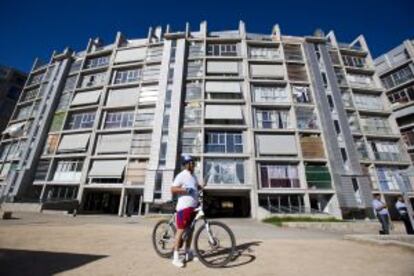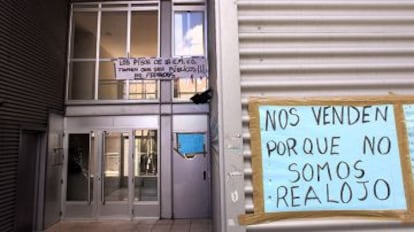Madrid sale of public housing to vulture fund was illegal, report finds
Regional comptroller sees irregularities in Blackstone’s purchase of 1,860 homes in 2013

A Madrid audit agency has found serious irregularities in the sale of public housing by city authorities to what is popularly referred to as a “vulture fund.”
The Cámara de Cuentas de Madrid, the regional comptroller, found evidence of misuse of insider information, lack of competition and transparency, and tremendous losses for the capital’s finances in the sale of 1,860 subsidized apartments to the Magic Real State/Blackstone group.
Since the transaction was completed in 2013, under then-mayor Ana Botella of the Popular Party, tenants have been fighting their new landlord, who has already evicted several dozen families unable to pay the new rent
Since the transaction was completed in 2013, under then-mayor Ana Botella of the Popular Party, tenants have been fighting their new landlord, who has already evicted several dozen families unable to pay the new rent.
The comptroller’s preliminary report, to which EL PAÍS has had access, details around 10 suspect moves by the municipal housing corporation, the Empresa Municipal de la Vivienda y Suelo (EMVS), which sold the homes.
The US fund paid €128.5 million for the deal, around €32 million less than the value at which several studies had assessed the property. The Botella administration justified the move by citing the need to balance the EMVS’s accounts.
The city planning chief at the time, Paz Fernández, is currently retired from politics and has declined to comment on the matter until the Cámara’s report is finalized. She has filed appeals against some of its content, but would not reveal their nature.
The Cámara de Cuentas has asked Botella and the former manager of EMVS, Fermín Oslé, to provide explanations about the irregularities. The former mayor has not personally replied to the comptroller, and instead supports the appeals filed by members of her team.

The 65-page report describes actions that, in some cases, might be construed as crimes. “It was the parties interested in the purchase [of these homes] who set the sale price, and [the latter] was simply accepted,” it reads.
The EMVS “bypassed internal contracting instructions” set out by its own board in 2008, and divested itself of the property “without a tender dossier and without previously establishing its market value.”
In other words, the buyer and the EMVS privately negotiated the price without an official assessment or any legal and technical reports confirming the viability of the transaction.
Sign up for our newsletter!
The EL PAÍS English Edition is launching a weekly newsletter. Sign up today to receive a selection of our best stories in your inbox every Saturday morning. For full details about how to subscribe, click here.
The sale also violated “the criteria of rationality, economy and efficiency that should preside the management of public assets.”
According to this document, in 2012 and 2013 the city of Madrid sold off 6,844 municipally owned properties, making €261.8 million on the sales.
These included the aforementioned 1,860 homes, which had been originally rented out as part of city programs to assist low-income families and the young. Many of these tenants had signed lease options with the EMVS, giving them purchase rights over the homes after seven to 10 years of renting, depending on the contract.
The comptroller’s study shows that all of these units were sold as a block, violating the law and ignoring the tenants’ right to exercise their purchase options.

When the leases ran out, the new landlord raised the rent by as much as 43% in some cases, explains Arancha Mejías, president of a support group for affected tenants. “You went from paying around €400, depending on how many square meters your unit had, to around €700. And shared community fees also went up. Then came the evictions: around 15 in the Carabanchel development alone.”
Residents eventually turned to the courts, noting that the city had awarded the sale to a group that has business ties to other companies that employ Botella’s eldest son, José María Aznar Botella (son of former Spanish Prime Minister José María Aznar).
The case was dismissed by the judge, but in light of the comptroller’s report, Mejías said that they would press to have it reopened.
English version by Susana Urra.
Another suspect sale
Right around the same time as the Magic Real State/Blackstone deal, the regional government of Madrid, then under Ignacio González (also of the PP), sold 2,935 subsidized homes using a similar procedure to another "vulture fund," Azora-Goldman Sachs.
Residents affected by that sale filed a lawsuit that led to the resignation of the head of the regional housing agency, IVIMA.
Tu suscripción se está usando en otro dispositivo
¿Quieres añadir otro usuario a tu suscripción?
Si continúas leyendo en este dispositivo, no se podrá leer en el otro.
FlechaTu suscripción se está usando en otro dispositivo y solo puedes acceder a EL PAÍS desde un dispositivo a la vez.
Si quieres compartir tu cuenta, cambia tu suscripción a la modalidad Premium, así podrás añadir otro usuario. Cada uno accederá con su propia cuenta de email, lo que os permitirá personalizar vuestra experiencia en EL PAÍS.
¿Tienes una suscripción de empresa? Accede aquí para contratar más cuentas.
En el caso de no saber quién está usando tu cuenta, te recomendamos cambiar tu contraseña aquí.
Si decides continuar compartiendo tu cuenta, este mensaje se mostrará en tu dispositivo y en el de la otra persona que está usando tu cuenta de forma indefinida, afectando a tu experiencia de lectura. Puedes consultar aquí los términos y condiciones de la suscripción digital.








































